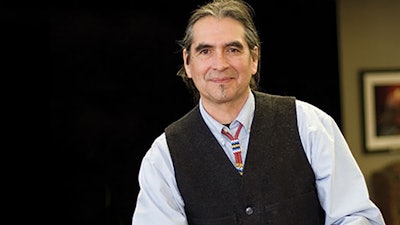The culture at Navajo Technical University in the deserts of New Mexico feels different from that of the College of Menominee Nation, nestled among the Great Lakes in Wisconsin, or from Haskell Indian Nations University, located on the Great Plains in eastern Kansas, where Dr. Daniel Wildcat is a professor.
The reason for this, Wildcat says, is attributed to the power of place.
 Dr. Daniel Wildcat
Dr. Daniel Wildcat
“Our cultures and our identities emerge as unique people of the desert or unique peoples of the forest or unique people of the coastal waters,” he continues. “So the topics those schools would talk about would all be relevant to that place. I think that is one of the beautiful things about tribal colleges and universities (TCUs).”
It’s also something Wildcat believes mainstream institutions could learn from TCUs. An intimate connection to one’s place, he says, is precisely the mindset needed for fighting climate change.
A Yuchi member of the Muscogee Nation of Oklahoma, Wildcat has been a sociology professor in Haskell’s School of American Indian Studies for about three decades now, but his influence has since echoed to a national scale.
He’s been a major force in forming The Indigenous People’s Climate Change Working Group, a nationwide tribal college-centered network that’s addressing climate change issues. And he’s authored several books, the most recent one titled, Red Alert: Saving the Planet with Indigenous Knowledge.




















